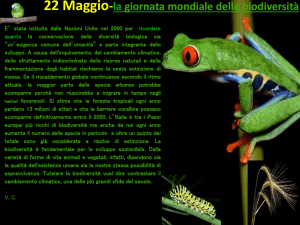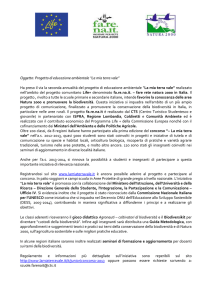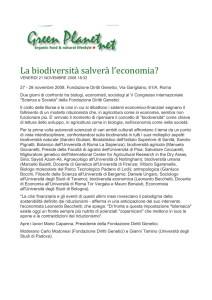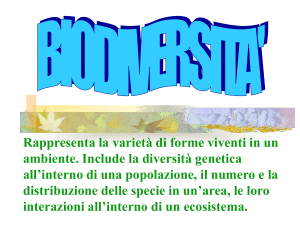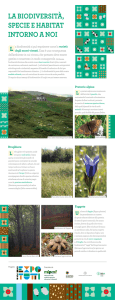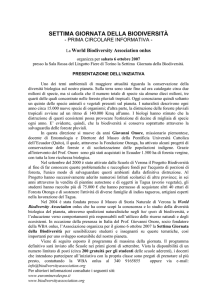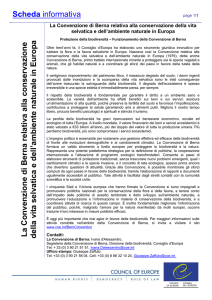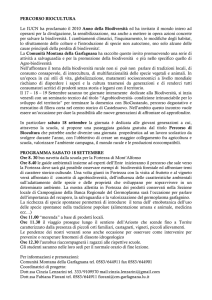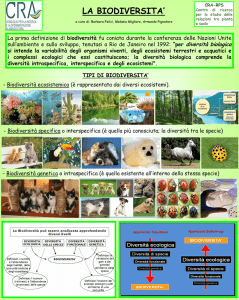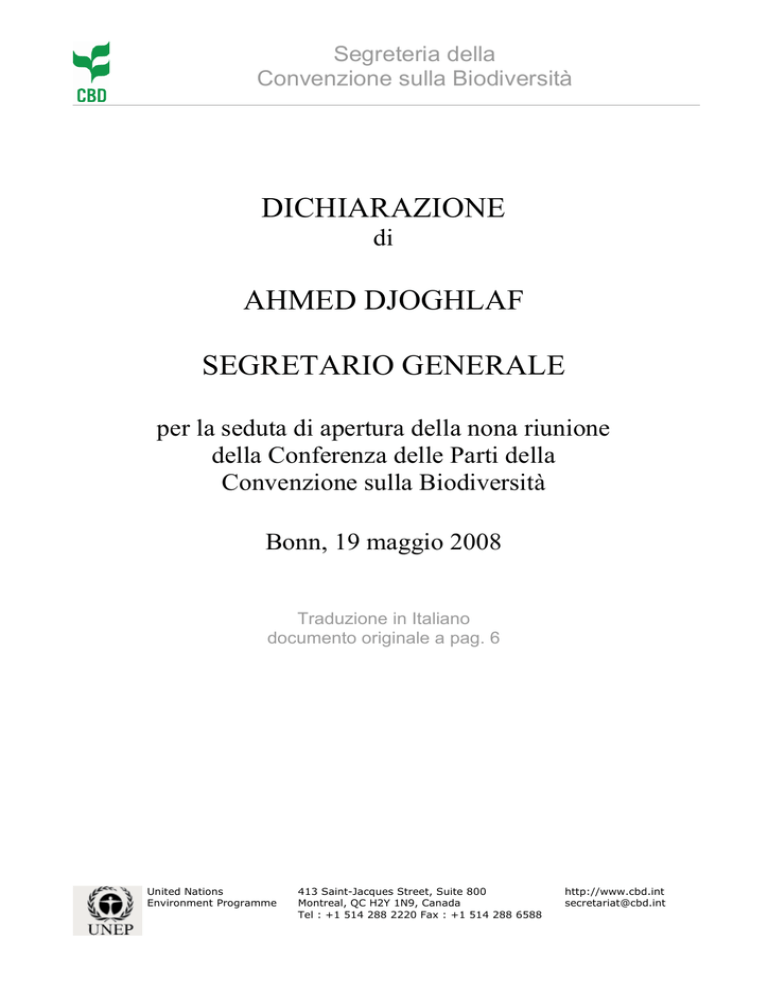
Segreteria della
Convenzione sulla Biodiversità
DICHIARAZIONE
di
AHMED DJOGHLAF
SEGRETARIO GENERALE
per la seduta di apertura della nona riunione
della Conferenza delle Parti della
Convenzione sulla Biodiversità
Bonn, 19 maggio 2008
Traduzione in Italiano
documento originale a pag. 6
United Nations
Environment Programme
413 Saint-Jacques Street, Suite 800
Montreal, QC H2Y 1N9, Canada
Tel : +1 514 288 2220 Fax : +1 514 288 6588
http://www.cbd.int
[email protected]
Signore e Signori,
Il mese scorso, durante la visita a S. Giovanni in Antigua e Barbuda, ho appreso una poesia che
viene insegnata agli scolari in tutta la regione dei Caraibi:
- Giugno: troppo presto.
- Luglio: tieniti pronto
- Agosto: devi stare attento
- Settembre: ricordare
- Ottobre: tutto finito
Questo detto deriva dalla conoscenza locale cresciuta nel corso dei secoli riguardo l’uragano
stagionale, conoscenza, che ha superato la prova del tempo e permesso alla comunità di
sopravvivere e prosperare.
Tuttavia, questo detto potrebbe perdere la sua saggezza molto presto.
L'anno scorso le Nazioni Unite avevano lanciato appelli 13 per l'assistenza umanitaria, battendo un
record. Dodici appelli erano legati a catastrofi climatiche.
Nel marzo scorso, onde insolitamente alte fino a 10 metri, hanno ripetutamente investito le coste
dalla Guiana alla Repubblica Dominicana causando gravi danni alle scogliere coralline in tutta la
regione. Le barriere coralline, che rappresentano fertili zone di pesca e di protezione dalle tempeste,
sono tra gli ecosistemi più vulnerabili sulla Terra.
Per accrescere la consapevolezza del loro enorme valore e fragilità, la comunità internazionale sta
celebrando, questo anno, l'Anno internazionale della Barriera Corallina.
Il 20 per cento delle barriere coralline sono state distrutte in tutto il mondo. Il 24 per cento è in
pericolo imminente, ed un ulteriore 26 per cento è minacciato a più lungo termine.
Anche la scomparsa degli squali sta pregiudicando le barriere coralline, e il drammatico declino
delle popolazioni di squali sta pregiudicando la stabilità di tutto il sistema marino.
Alcune aree del mondo hanno di recente registrato un calo fino al novantanove per cento di alcune
grandi popolazioni di squali. Di conseguenza la popolazione delle loro prede è drammaticamente in
espansione, che a sua volta determina un depauperamento delle popolazioni che si trovano più in
basso nella catena alimentare. L’aumento delle prede degli squali determina una diminuzione dei
pesci che si nutrono di alghe. L’aumento delle alghe sta portando un enorme stress alla barriera
corallina.
Gli squali sono un elemento essenziale per la salute degli ecosistemi corallinni.
La perdita di 73 milioni di squali non sta solo pregiudicando le sorti di questi ecosistemi, ma sta
anche devastando le popolazioni di molluschi, che svolgono un ruolo di primo piano nel filtraggio
delle acque, nella riduzione dei sedimenti nel miglioramento della qualità delle acque.
La rapida scomparsa dei grandi squali negli oceani del mondo sta portando ad un aumento del
numero dei molluschi predatori, che perturba gli ecosistemi marini nel loro complesso.
Il fatto è che ogni specie ha un ruolo da svolgere e la sua scomparsa minaccia il suo ecosistema.
Questo è il sistema di relazioni della vita.
Albert Einstein, una volta osservò che: “Non sappiamo ancora un millesimo dell’un per cento di
quello che la natura ci mostra”.
Nonostante scoperte scientifiche e progressi tecnologici senza precedenti, noi esseri umani abbiamo
ancora molto da imparare dalla natura. Tutta la vita sulla Terra è interdipendente. Le specie non
possono sopravvivere senza il loro habitat naturale e, a sua volta, quest'ultimo viene influenzato
dalla loro scomparsa.
In Kenya, sono state erette recinzioni intorno alle acacie per tenere lontano giraffe ed elefanti, nella
convinzione che ciò avrebbe consentito agli alberi di prosperare. Questo ha interrotto un elemento
essenziale della loro relazione simbiotica. Senza erbivori, gli alberi producono un numero inferiore
di spine. Con un minor numero di spine e meno linfa, le formiche migrano verso altri alberi,
lasciando invadere gli alberi dai coleotteri del legno.
Invece di proteggere le acacie, le recinzioni le hanno isolate dalla loro natura, aumentandone la
vulnerabilità. La conservazione della biodiversità non è mantenere le specie a distanza l’una
dall’altra. La biodiversità non si conserva con la costruzione di recinzioni intorno a parchi nazionali
che mantengono l’uomo fuori. Si conserva invece attraverso l’interazione tra tutte le specie e il
proprio ecosistema naturale. Si tratta di UNA NATURA.
Ogni specie è un pezzo fondamentale nel complesso puzzle della rete della vita sul nostro pianeta.
Le interconnessioni sono quelle che mantengono i pezzi del puzzle incollati permettendo al pianeta
di funzionare.
E.O. Wilson ha ricordato che: “Se fosse l’umanità a scomparire, il pianete rigenererebbe il ricco
stato di equilibrio che lo caratterizzava diecimila anni fa. Se fossero invece gli insetti a scomparire,
l'ambiente e il pianeta crollerebbe nel caos”.
Circa due terzi delle colture alimentari che sfamano il mondo esistono grazie all’impollinazione di
insetti o altri animali consentendo la produzione di frutta e semi sani e salubri.Tra queste colture ci
sono le patate. Qui in Germania, vi è stato un 25 per cento di calo della popolazione di api in tutto il
paese. Nella parte orientale degli Stati Uniti, il numero delle api è calato del 70 per cento.
Se scompaiono le api impollinatrici scompaiono anche molte specie di piante e colture.
Se rompiamo un collegamento, rompiamo l’intera catena.
Albert Einstein una volta disse:
“Se l'ape scompare dalla faccia del pianeta, all'uomo rimarrebbero sono quattro anni di vita.
Niente api, niente impollinazione, niente piante, niente animali, niente uomo".
L’attuale sviluppo della crisi alimentare globale suona come una sveglia per le gravi conseguenze
delle attività umane sulla capacità del nostro pianeta di continuare a sostenere la vita sulla Terra.
Il drammatico aumento dei prezzi dei raccolti è un sintomo della perdita senza precedenti della
biodiversità agricola e certamente un riflesso della sua vasta portata come impatto sul genere
umano. Per ridurre al minimo l'impatto della crisi alimentare in Bangladesh, le persone sono state
recentemente invitate a mangiare più patate che riso.
Per questo abbiamo celebrato l'Anno Internazionale della Patata quest’anno, vale la pena di notare
che le patate sono anche un sinistro promemoria della necessità di mantenere la diversità genetica
nella nostra alimentazione basata sulle colture.
La storia ha dimostrato che affidarsi soltanto a poche varietà può portare al disastro, come si è visto
in Irlanda nel 1840, quando una infezione delle patate portò alla fame di un milione di persone e
costrinse un altro milione di emigrare in Gran Bretagna o in Nord America.
La patata rappresenta l'importanza di un approccio ecosistemico, auspicato dalla nostra
Convenzione, la convenzione per la vita sulla Terra.
Tutte le parti di un ecosistema svolgono un ruolo nel garantire una sana coltura della patata.
Le patate rappresentano l'intricata interconnessione delle specie e il mutualismo che esiste in natura.
Felix Mendelssohn una volta disse: “L'essenza del bello è l'unità nella varietà”.
Questa osservazione cattura uno dei più fondamentali e vitali, nonchè vulnerabili, aspetti del mondo
naturale: l'interconnessione delle diverse specie e degli ecosistemi che li rende unici, speciali e
insostituibili. Queste interazioni, che si sono sviluppate nel corso di millenni di evoluzione, sono
senza alcun dubbio insostituibili.
Tuttavia, questa rete della vita è in pericolo, e il più grande colpevole siamo noi.
L’impatto sulle funzioni naturali del nostro pianeta non è mai stato così distruttivo come negli
ultimi 50 anni. Nel corso degli ultimi cento anni gli uomini hanno prodotto un aumento del tasso di
estinzione delle specie viventi ben 1.000 superiore rispetto al naturale corso nella storia della Terra,
come si evince dai dati e gli studi sui fossili.
La settimana scorsa, il WWF ha rilasciato il suo Living Planet Index (Indice di Vita sul Pianeta), un
unica misura dello stato della biodiversità mondiale.
Esso traccia la popolazione di circa 4.000 specie e mostra un calo spaventoso del 27 per cento a
livello globale, le popolazioni di specie terrestri tropicali mostrano una diminuzione del 46 per
cento. Come tutti sappiamo l'80 per cento della biodiversità del nostro pianeta si trova in foreste
tropicali.
La relazione ha anche confermato che l'impronta totale dell’umanità ha superato la capacità
produttiva della biosfera del 25 per cento, e il suo tasso di crescita non ha mostrato alcun segno di
diminuzione. Il costo di questa situazione è stato valutato dall'autore principale dello studio
Economia degli ecosistemi e della biodiversità, Mr Pavan Sukhdev, a 3,1 trilioni di dollari l'anno
(3,1 miliardi di miliardi di dollari) ovvero il 6% del totale prodotto nazionale globale lordo.
Come sempre, i più poveri stanno pagando il peso di questi costi.
Pertanto, affrontare la sfida planetaria di perdita della biodiversità, aggravata dal cambiamento
climatico, richiede una rinnovata cooperazione internazionale e il pieno impegno di tutte le parti
interessate. Dopo l'ultima riunione a Curitiba, alla famiglia mondiale della biodiversità si sono uniti
Timor Est e il Montenegro. Stanno partecipando al nostro incontro per la prima volta come parte
della Convenzione sulla Biodiversità. Si è inoltre unito oggi il Brunei. Desidero dare il benvenuto
alle tre nuove nazioni della famiglia della biodiversità.
Il recente ciclone Nargis che ha devastato Myanmar, riporta la memoria di orrore dello tsunami del
2004, così come l'uragano Katrina. Con il recente micidiale tornado in Oklahoma e Arkansas,
quest’anno registreremo il maggior numero di decessi da tornado negli Stati Uniti dal 1998.
La gravità e la frequenza dei 1.270 cicloni all’anno negli Stati Uniti ci ricorda che nessun paese è
immune dagli effetti devastanti del deterioramento dell’ambiente.
Quello che si perde in un paese è perso per tutto il mondo.
Gli Stati Uniti hanno bisogno di far parte della Convenzione sulla Biodiversità, così come la
Convenzione sulla ha bisogno di loro e degli altri tre rimanenti paesi che devono ancora diventare
parte della Convenzione.
E’ mia sincera speranza che, entro il 2010 si celebri l'Anno internazionale della Biodiversità come
una unica famiglia universale composta da tutti i membri della comunità internazionale delle
nazioni, senza alcuna eccezione.
Perché siamo tutti parte della rete della vita, e ogni paese, piccolo o grande, sviluppato o in via di
sviluppo, del Nord o Sud, Est o Ovest, ha un chiaro interesse a garantire l'attuazione dei tre obiettivi
della Convenzione sulla vita sulla Terra. Perchè noi siamo un UNICO MONDO.
Come Einstein una volta sottolineò: “Non possiamo risolvere i problemi utilizzando lo stesso tipo di
pensiero che abbiamo usato per generarli”.
A Curitiba, una nuova fase di maggiore attuazione dei tre obiettivi della convenzione è nato.
Permettetemi di rendere omaggio al Brasile e Marina Silva, in particolare, per la sua leadership e il
nuovo modo di pensare che ha guidato i lavori della Convenzione per gli ultimi due anni.
La maggiore fase di attuazione della Convenzione richiede l'impegno attivo di tutti i soggetti
interessati. L'istituzione di un’alleanza universale globale per proteggere la vita sulla Terra è
urgente. Questo è il nostro futuro. Il nostro futuro inizia oggi. Alla chiusura del nostro incontro,
avremo meno di 579 giorni per adempiere la promessa fatta dai capi di Stato e di governo a
Johannesburg per ridurre sostanzialmente la perdita di biodiversità entro il 2010.
Abbiamo anche meno di due anni a sinistra per soddisfare l’impegno preso a Curitiba di adottare un
regime internazionale in materia di accesso e condivisione dei benefici. La sfida del futuro è
davvero scoraggiante e richiede sforzi eccezionali.
Come Johann Wolfgang von Goethe disse una volta: “Una nuova attività è l'unico mezzo per
superare le avversità”.
Per un incontro eccezionale, la Convenzione ha trovato un eccezionale leader di accoglienza e
promozione di nuove attività. Per un incontro eccezionale, la nona riunione della Conferenza delle
parti è ospitata dal popolo e dal governo della Germania, che ha dimostrato il proprio impegno a
raggiungere i tre obiettivi della Convenzione.
Dalla riunione di esperti tenutasi a Potsdam nel dicembre 2006, e ieri a Naturathlon, la Germania ha
dimostrato che ospitare una riunione della biodiversità non significa solo fornire servizi per le
conferenze, ma anche coinvolgere un intero popolo: governo e popolo.
Attraverso la sua ricca campagna per la biodiversità, il nostro padrone di casa ha dimostrato che per
vincere la battaglia per la vita sulla Terra è necessario convincere il cuore dei cittadini del mondo.
Il mese scorso, il Segretariato di Google ha ricevuto 130 segnalazioni di articoli pubblicati in
Germania sulla biodiversità. Nel corso degli ultimi due settimane, più di 100 articoli sulla
biodiversità sono stati pubblicati nelle principali testate tedesche nazionali e locali.
Come risultato la biodiversità è stata nei titoli dell'International Herald Tribune e sulla pagina di
uno degli ultimi numeri di Die Zeit, uno dei più letti settimanali tedeschi.
Attraverso l'organizzazione di più di 200 eventi collegati, la Germania ha dimostrato la strada da
seguire. Attraverso la sua tripla presidenza del G8, dell'Unione Europea e di questo incontro, la
Germania ha dimostrato che ospitare una riunione della Convenzione della biodiversità significa
avere visione e leadership e saper essere anche di esempio. Presidente Köhler, Cancelliere Merkel,
ministri Gabriel e Seehofer, Mr Jochen Flasbarth, Signora Sindaco Dieckmann, ogni cittadino della
Germania, vi ringrazio di tutto cuore per il vostro impegno.
Vielen Dank!
Grazie per la vostra cortese attenzione.
Secretariat of the
Convention on Biological Diversity
STATEMENT
of
AHMED DJOGHLAF
EXECUTIVE SECRETARY
at the
OPENING SESSION
of the
NINTH MEETING OF THE CONFERENCE OF THE PARTIES
TO THE CONVENTION ON BIOLOGICAL DIVERSITY
Bonn, 19 May 2008
Please check against delivery
United Nations
Environment Programme
413 Saint-Jacques Street, Suite 800
Montreal, QC H2Y 1N9, Canada
Tel : +1 514 288 2220
Fax : +1 514 288 6588
http://www.cbd.int
[email protected]
Ladies and Gentlemen
Last month while visiting St John in Antigua and Barbuda, I learned about a poem
that schoolchildren throughout the Caribbean region are taught:
―June – too soon.
July – stand by!
August – look out you must.
September – remember.
October – all over.‖
This saying stems from local knowledge about the hurricane season built up over
centuries—knowledge that has withstood the test of time and enabled communities to survive
and flourish. However, this saying may very soon lose its wisdom. Last year the United
Nations launched 13 appeals for humanitarian assistance, breaking a record. Twelve of them
were climate-related disasters. Last March, unusually large waves reaching as high as 30
feet, lashed coastlines from Guyana to the Dominican Republic causing serious damage to
coral reefs across the region. Indeed, while providing fertile fishing grounds, and protection
from storms, coral reefs are among the most vulnerable ecosystems on Earth.
To raise awareness of their tremendous value and fragility, the international
community is celebrating, this year, the International Year of the Reef. Twenty per cent of
coral reefs have been destroyed worldwide. Twenty-four per cent are in imminent danger,
and a further 26 per cent are threatened over the longer term. Even the disappearance of
sharks is affecting coral reefs, and the dramatic decline in shark populations is affecting the
stability of the entire marine system.
Some areas of the world have recently seen a decline of up to ninety-nine per cent in
some large-shark populations. As a result the population of their prey is expanding
dramatically, which in turn results in a depletion of populations lower on the food chain.
Carnivorous groupers feed on algae-grazing parrotfish. With fewer parrotfish, algae growth
is increasing the stress on coral reefs. Indeed, sharks are an essential element for the health
of coral ecosystems.
The loss of 73 million sharks is not only affecting coral ecosystems, but is also
leading to the devastation of shellfish populations, which play a major role in water filtration
by reducing sediments and improving water quality. The rapid decline of large sharks in the
world’s oceans is leading to an increase in the number of shellfish predators, thus disrupting
marine ecosystems as a whole. The fact is that every species has a role to play and its
disappearance disturbs its ecosystem. This is what the web of life is about.
Albert Einstein once noted that, ―We still do not know one thousandth of one per cent
of what nature has revealed to us.‖ In spite of unprecedented scientific discoveries and
technological advances, we human beings still have much to learn from Nature. All life on
Earth is interconnected. Species cannot survive without their natural habitat and, in turn, the
latter is being impacted by their disappearance.
In Kenya, fences were erected around acacia trees to keep away giraffes and
elephants, in the belief that this would allow the trees to thrive. This severed a vital
symbiotic relationship. Without herbivores, the trees produce fewer thorns. With fewer
thorns and less sap, ants move on to other trees, giving way to wood-boring beetles that
2
invade the tree. Instead of protecting the acacia trees, the fences isolated them from nature,
increasing their vulnerability. Conservation of biodiversity is not about keeping one species
away from another. It is not about building fences around national parks and keeping humans
out. It is about interaction between all species and their natural ecosystem. It is about ONE
NATURE.
Every species is a vital piece in the complex puzzle of the life web of our planet.
Interlinkages are what keep the puzzle glued together—for the planet to function. E.O.
Wilson pointed out that, ―If all mankind were to disappear, the world would regenerate back
to the rich state of equilibrium that existed ten thousand years ago. If insects were to vanish,
the environment would collapse into chaos.‖
About two thirds of the food crops that feed the world rely on pollination by insects or
other animals to produce healthy fruits and seeds. Included among these are potato crops.
Here in Germany, there has been a 25 per cent drop in bee populations across the country. In
the eastern United States, bee stocks have declined by 70 per cent . If pollinators disappear,
so too will many species of plants. If we take away one link, the chain is broken. .
As Albert Einstein once said, ―If the bee disappeared off the surface of the globe, then
man would only have four years of life left. No more bees, no more pollination, no more
plants, no more animals, no more man.” The unfolding global food crisis sounds like a
wake-up call to the serious consequences of human activities on the ability of our planet to
continue sustaining life on Earth. The dramatic rise in crop prices is a symptom of the
unprecedented loss of agricultural biodiversity and certainly a reflection of its far-reaching
impacts on humankind. To minimize the impact of the food crisis in Bangladesh, people
have been recently encouraged to eat more potatoes than rice.
As we also celebrate the International Year of the Potato this year, it is worth noting
that potatoes are also a grim reminder of the need to maintain genetic diversity in our staple
food crops. History has shown that relying on only a few varieties can lead to disaster, as
seen in Ireland in the 1840s when potato blight resulted in the starvation of one million
people and forced another one million to emigrate to Britain or North America.
The potato represents the importance of an ecosystem approach, advocated by your
Convention, the convention on life on Earth. Indeed, all parts of an ecosystem play a part in
ensuring a healthy potato crop. Potatoes represent the intricate interlinkages of species and
mutualism that exists in nature.
As Felix Mendelssohn once noted, ―the essence of beautiful is unity in variety‖. This
remark captures one of the most fundamental and vital, yet vulnerable, aspects of the natural
world: the interconnectedness of its different species and ecosystems makes it unique,
special and irreplaceable. These interactions, which have developed over millennia of
evolution, are without doubt irreplaceable. However this web of life is under threat—and we
are the largest culprit.
Impacts on the natural functions of our planet have never been as destructive as in the
last 50 years. Over the past hundred years humans, have increased species-extinction rates by
as much as 1,000 times the typical background rates over Earth’s history, as inferred from the
fossil record. Last week, WWF released its Living Planet Index, a unique measure of the
state of the world’s biodiversity. It tracks nearly 4,000 populations and shows a frightening
overall decline of 27 per cent; populations of tropical terrestrial species appear to have
declined by 46 per cent. As we all know 80 per cent of the biodiversity of our planet is
3
located in tropical forests. The report also confirmed that humanity’s total footprint exceeded
the productive capacity of the biosphere by 25 per cent, and its rate of growth showed no sign
of diminishing. The cost has been evaluated by the lead author of the study The Economics
of Ecosystems and Biodiversity, Mr. Pavan Sukhdev, at 3.1 trillion dollars a year or 6% of
overall gross national product. As always, the poorest are bearing the brunt of the cost.
Therefore, addressing the planetary challenge of biodiversity loss compounded by
climate change requires renewed international cooperation and the full engagement of all
stakeholders. Since the last meeting in Curitiba, the world’s biodiversity family has been
joined by Timor Leste and Montenegro. They are attending our meeting for the first time as
Parties. We have also been joined today by Brunei Darussalam. I would like to welcome the
three new Parties to the biodiversity family.
The recent cyclone Nargis, which devastated Myanmar, brings back memories of the
horror of the 2004 tsunami, as well as hurricane Katrina. With the recent deadly tornados in
Arkansas and Oklahoma, this year is on pace to see the most deaths from tornadoes in the
United States since 1998. The severity and the frequency of the 1,270 tornados a year in the
United States are a reminder that not a single country is immune from the devastating effects
of the deterioration of our environment.
What is lost in one country is lost to the world. The United States needs the CBD
family just as the CBD family needs them and the other three remaining countries that have
yet to become parties to the Convention. It is my sincere hope that by 2010 we shall
celebrate the International Year of Biodiversity as a united universal biodiversity family
comprising all members of the international community of nations, without any exception.
Because we are all part of the web of life, each country, small or big, developed or
developing, North or South, East or West, has a vested interest in ensuring the
implementation of the three objectives of the Convention on life on Earth. Indeed, we are
One World.
As Einstein once pointed out, ―We cannot solve problems by using the same kind of
thinking we used when we created them.‖ In Curitiba, a new phase of enhanced
implementation of the three objectives of the Convention was born. Let me pay tribute to
Brazil and to Marina Silva, in particular, for her leadership and the new thinking that steered
the work of the Convention for the last two years. Muito Obrigado
The enhanced phase of implementation of the Convention calls for the active
engagement of all stakeholders alike. The establishment of a universal global alliance for
protecting life on Earth is urgently required. This is about Our Future.
Our future starts today. At the closure of our meeting, we will have less than 579
days left to fulfil the promise made by Heads of State and Government in Johannesburg to
substantially reduce the loss of biodiversity by 2010. We also have less than two years left to
fulfil the Curitiba commitment to adopt an international regime on access and benefit sharing.
The challenge ahead is truly daunting and calls for exceptional efforts.
As Johann Wolfgang von Goethe once said, ―Fresh activity is the only means of
overcoming adversity‖. For an exceptional meeting, the Convention has found an
exceptional host and leader promoting fresh activities. For an exceptional meeting, the ninth
meeting of the Conference of the Parties is hosted by the people and Government of
Germany, who have demonstrated their commitment to achieving the three objectives of the
Convention.
4
From the expert meeting held in Potsdam in December 2006, to yesterday’s
Naturathlon, Germany has demonstrated that hosting a biodiversity meeting means not only
providing conference facilities but also involving an entire nation: Government and people.
Through its unique biodiversity campaign, our host has shown that to win the battle for life
on Earth you need to win the heart of the citizens of the world. Last month, the Secretariat
received 130 Google alerts on articles published in Germany on biodiversity. Over the last
two weeks, more than 100 articles on biodiversity have been published in major German
national and local newspapers and magazines. As a result biodiversity was in the headlines of the
International Herald Tribune and on page one of the latest issue of Die Zeit, one of the most read
German weekly news magazines Through the organization of more than 200 COP-related
events, Germany has shown the way ahead. Through its triple presidency of the G8, the
European Union and this meeting, Germany has demonstrated that hosting a meeting of the
biodiversity family is a matter of providing leadership and vision as well as setting the
example. President Köhler, Chancellor Merkel, Ministers Gabriel and Seehofer, Mr. Jochen
Flasbarth, Lady Mayor Dieckmann, every citizen of Germany, I thank you whole-heartedly
for your efforts. Vielen Dank!
Half measures and business-as-usual are no longer options when it comes to the
unprecedented environmental challenges that the world faces today. The biodiversity family
is called upon to meet our host’s national initiative, to make Bonn the United Nations city for
sustainable development a global and universal ―Globale Naturallianz‖.
Ladies and Gentlemen,
Albert Einstein also said, “A human being is part of the whole called by us universe,
a part limited in time and space. We experience ourselves, our thoughts and feelings as
something separate from the rest. A kind of optical delusion of consciousness…. a kind of
prison…Our task must be to free ourselves from the prison by widening our circle of
compassion to embrace all living creatures and the whole of nature in its beauty….We shall
require a substantially new manner of thinking if humanity is to survive.‖
Let us be inspired by Einstein’s wisdom so as to liberate from the prison the 565
bracketed words contained in the 173 pages of decisions before you. Let us widen our circle
for it is indeed to this end Biologische Vielfalt braucht unser Engagement Eine Natur,
Eine Welt, Unsere Zukunft—One Nature, One World, One Future.
Vielen Dank
Thank you for your kind attention.
5

